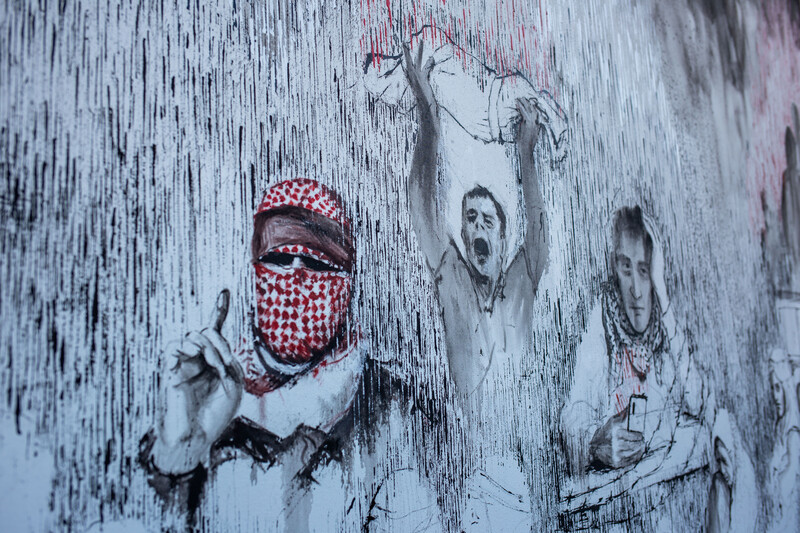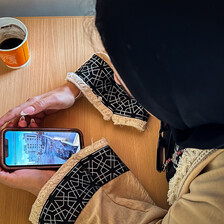The Electronic Intifada 18 September 2024

Kasim Tan, a Turkish artist, has tried to capture the pain people have experienced trying to survive Israel’s genocide in Gaza. The work is entitled ”Gaza” and measures 9 meters by 3 meters.
ZUMA PressDr Tasneem Abu Khater is a dentist and the sister of a close friend of mine, Raghad.
She is now in Turkey, getting treatment for her injuries.
This is her story as relayed to me:
On 7 October 2023, I was at my parents’ house with my baby daughters, Hala, six months old and Mira, 2.
I woke up to the sound of rockets, feeling fearful but wanting to protect my girls. The family decided that we should evacuate to the south. My father told me to go to my husband’s family in Nuseirat. I told him I wouldn’t leave him behind and insisted he come with us
After much discussion, he agreed. My husband came as well.
But the journey was tough. The sight of people fleeing their homes brought tears and reminded me of our 1948 Nakba and our exile.
Days passed, and the fear decreased a bit in the south, away from most of Israel’s indiscriminate bombardment at the time. Food started to run low, however, and with Israel cutting fuel and electricity supplies, we began baking with firewood.
At home, we stayed up together, comforting each other and discussing events. My sister-in-law Alaa was the most optimistic, always reading about ceasefire news.
I remember the bombing of the Al-Ahli Baptist hospital, with hundreds of martyrs.
We thought this might cause an outcry that would end the genocide.
We thought wrong.
World ends
On the night of 27 October, I woke up at 11 pm, feeling as if the world had ended.
Our house had been struck in an Israeli attack. I felt my soul but not my body.
Blood was oozing from my leg and the bone was sticking out.
“I leave my fate to You, O Allah,” I thought.
I started looking for my daughters. I saw my baby under the rubble, her face glowing despite the dust. I took her and held her, and then I saw my other daughter coming to me.
I felt my soul return.
I began hearing calls for help, smelling the unpleasant odor of explosives, and hearing my family calling for me and my twin, Shahd.
My brothers Muhammad and Ahmad came, and I felt relief just seeing them. Ahmad took my daughters and told me not to worry.
Muhammad lifted me out but when he saw my leg, his face changed. He began to cry because of the severity of the injury.
I felt no pain at all. I could only see darkness and flames. Paramedics came.
My optimistic sister-in-law Alaa was found in the neighbor’s house, with her daughter Iman, who was about a year old, in her arms. Both had been killed. Her son Ahmad, who was four, died with them.
The injuries to my husband’s siblings and parents were severe.
I started to see Alaa’s face in everyone around me.
Medical treatment
When I first woke up in Al-Aqsa hospital, I asked if I would be able to walk on my leg again, if I could return to work, and whether I could take care of my daughters.
My father and brother Ahmad were at my bedside. Their eyes betrayed their sadness and fear.
I had severe fractures in my leg, in the thigh and knee area. They put a plate on the fractures but did not attempt to repair any bone since they had no resources and the hospital was under severe pressure.
Hala was also injured in the thigh area. They didn’t tell me the severity of the injury so I wouldn’t worry too much. But I suffered when I heard her crying from her pain.
Others in the family were evacuated to another place and Mira was with them. My younger sister Raghad was like a mother to her. I refused to have her come and visit me in hospital, which caused me great anguish. But I was very afraid something might happen to her on the way.
Ahmad tried to find a referral for treatment abroad. On 7 November, I was told I would travel to Egypt with Ahmad as an escort. I was afraid to go without my daughters, but my father reassured me that I needed to go and get treatment.
During my treatment in Egypt, I underwent a 10-hour surgery. When I came out of it, the pain was excruciating. That night was extremely long.
I cried every day in hospital from missing my daughters and entered a severe state of depression. But the hospital staff in Egypt became like family, and my doctor checked on me every day.
One day, my brother called and said a referral for treatment had come for Hala to go to Turkey, and that her escort would be my sister. I was surprised that Hala’s injury needed a referral; I thought it was less severe. I was very concerned and asked the medical staff if I could go to Turkey with my daughter.
The next day my sister and Hala arrived in Egypt. I felt great but also longed for Mira, still in Gaza. We stayed in Egypt for a week until the referral to Turkey came through.
I continued my treatment in Turkey and underwent seven surgeries on my leg and ear because I had bled from my ear due to the force of the explosion. I am continuing my treatment and follow-ups at the hospital in Turkey.
Family connections
I talk to my husband and daughter in Gaza every day, checking on them, and praying for them. I had hoped that he would travel with the other injured for treatment abroad. However, things did not work out that way. Instead, he managed to secure a permit to travel with Mira to Egypt where they both now are.
Since 27 October, I have been deprived of seeing and holding my daughter. I think about her every day and worry about her. It has been the hardest 10 months without her. I fear she might forget me.
One time she asked me: “Mom, why did you leave me? I’m upset with you.”
I was shocked and saddened. But she also tells me she waits for me every day. I pray to God that we will reunite as soon as possible.
Rifqa Hijazi is a student from Gaza.





